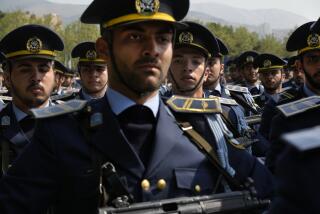Holidays Are a Nexus to the Axis
- Share via
Season’s greetings from the “axis of evil.” It’s snowing lightly, and in the outskirts of Tehran the cedar trees are dusted with the fine, white powder that evokes a holiday spirit in many parts of the world.
Here the festivities ended a while ago. City workers have removed most of the colored lights and other festive decorations from Tehran’s buildings, and since Ramadan culminated with the feast of Eid on Dec. 6, Tehranis slowly have gotten back to business in earnest. Most of which is not particularly evil.
The newspapers report the trade talks between Iran and the European Union, which the government hopes will lead to an end run around U.S. economic pressure on the Islamic Republic. The Tehran Times reports that if a war in Iraq triggers oil shortages, Iran will be able to cash in by boosting oil production by half a million barrels a day. Readers are assured that Iraqi opposition groups will not be allowed to use Iranian soil to launch attacks against Saddam Hussein’s forces.
But people are wary of unfolding events. With the threat of war next door and the U.S. accusing the government of building secret nuclear facilities, some here fear that Iran could be next in line after Iraq. So a U.S. citizen here is an interesting, and unusual, specimen. Intelligence types are certainly curious. They’ve already confiscated my cassette recorder and two notebooks, which they are still poring over, apparently to ensure that I am neither involved in espionage nor doing advance work for a new James Bond film.
At a pro-reform student demonstration, several mirthless plainclothes officers closely examined the insoles of my shoes, as well as my wallet and the strange American bank card with the horse-and-carriage picture on it. They did not take my fingerprint, which the government has threatened in retaliation for the U.S. doing so to visiting Iranians. They videotaped me repeating my name and confirming that I am from the United States of America. They did not find it as funny as I did that their cell phone ringer played “Oh Susanna.”
Upon learning that I’m a U.S. citizen, many Iranians ask unsettling questions: Why has my country never owned up to toppling their popular leader, Prime Minister Mohammed Mossadegh, in 1953? Or apologized for the shooting down of an Iran Air flight over the Persian Gulf in 1988 that killed 290 people? Why is the democracy-touting U.S. so uncompromisingly against dialogue with Iran, which is far more democratic than some U.S. allies in the region?
Yet these questions usually come over a cup of tea and in a genuinely conciliatory atmosphere. I have already received several personal apologies for the embassy hostage crisis nearly a quarter of a century ago.
Sometimes the spirit of reconciliation goes embarrassingly wrong. Last week, my new translator, perhaps trying too hard to ingratiate himself, let out a loud diatribe against the Iranian regime as we walked along the busy Revolution Square.
“Iran is completely backward,” he said, pointing at a group of women wearing headscarves. “There is no freedom here, for men or for women!”
With passersby stopping to listen, I felt oddly compelled to defend the country’s merits. “It’s true that there are still inequalities, but Iran holds more elections than the U.S. or any European country,” I ventured, “and more than 50% of Iran’s university students are women. Democracy is beginning from scratch here.”
The translator vigorously disagreed, and the argument continued.
It was an odd role reversal. I peered around anxiously to see if we were being followed. To my dismay, two uniformed police officers appeared from out of the crowd. Their first question in Persian was: “Where are you from?” I didn’t lie. “America?” they asked. “Show us your papers.”
Worried, I produced my passport. The taller officer asked in English: “How do you like Iran?” Fine, I said, it’s a lovely country.
“Please, tell your people something,” he said, brushing a flake of snow from my passport as he handed it back. “We welcome you here, any time.”
I thanked him and turned to go, but he grabbed my shoulder to stop me.
“One more thing,” he said, smiling broadly. “Have a happy Christmas.”
More to Read
Sign up for Essential California
The most important California stories and recommendations in your inbox every morning.
You may occasionally receive promotional content from the Los Angeles Times.













